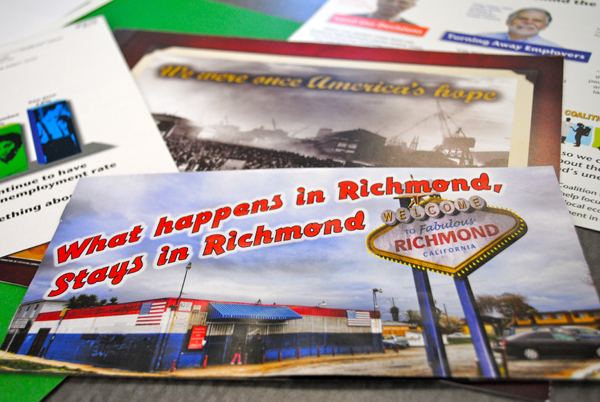Over the past few weeks, a full color brochure titled “The battle for the bay” turned up in the mailboxes of Richmond residents. The brochure shows two boxing gloves facing each other. “Out of town card rooms vs. Richmond city council” reads the text on the front page, implying that the Richmond city council is in favor of the proposal to build a casino at Point Molate and is fighting with out of town card rooms who oppose its construction. “Winners purse: Jobs & $20,000,000 a year for Richmond,” reads the text at the bottom of the front page. Inside, the brochure states that the casino project would create 12,000 jobs.
But the brochure was not an initiative of the Richmond city council — in reality Mayor Gayle McLaughlin, Vice Mayor Jeff Ritterman and councilmember Tom Butt have all expressed concerns about the building of the casino. The brochure was paid for by Upstream LLC, the developer that intends to build a casino resort at Point Molate. The mailing return address at the back of the brochure is Upstream’s. (Click here for the website version of the brochure.) This ad might have gone to the household recycle bin in many cases, but didn’t go unnoticed by residents who are concerned about the building of a casino.
“The entire messaging that the developer has been using is ‘We will bring jobs.’ The problem that a lot of people have with the message is that the numbers are hyper-inflated,” said Joan Garrett, a member of Citizens for a Sustainable Point Molate, a grassroots organization that opposes the construction of a casino.
Upstream officials readily admit that they are behind the ad and say that it was necessary to combat inaccurate information circulated by their opponents via other brochures. “Over the last six months there was a huge amount of misinformation put out about the project,” said Jim Levine, managing partner of Upstream, referring to other fliers and a TV ad opposing the building of the casino.
Levine specifically mentioned a brochure titled “What happens in Richmond stays in Richmond” mailed by a group called Stop the Mega Casino. This flier, which shows a parody of the famous “Welcome to Las Vegas” sign, claims that building a casino in Richmond is not going to bring positive changes or jobs. “If we allow the Pt. Molate Mega Casino, here’s what stays in Richmond: The drug dealing will stay … The crime will stay,” reads the brochure. “The Point Molate Mega casino is money Richmond will never see and jobs Richmond will never get,” it concludes.
“It was clear after we did some investigating that most of it was being put out by a consortium of card clubs,” said Levine. He claimed that the California Grand Casino, a card club in Pacheco, was one of them but didn’t want to mention others. (The California Grand Casino didn’t respond to Richmond Confidential for comment.)

A Contra Costa Times article published in May claims that fourteen card clubs are behind the Stop the Mega Casino campaign and were the ones responsible for the brochures and the ads. Levine says that card clubs “historically had no interest in doing anything for Richmond — they are just concerned about their own profits.”
Levine said that the “The battle for the bay” brochure was created to contest the “misinformation” on the fliers created by the card clubs. However, some people are questioning whether the Upstream brochure itself is spreading misinformation.
What got Garrett’s attention was the statement that the casino would create 12,000 jobs. Garrett claims that casino developments the size of the proposed casino at Point Molate generally employ between 1,500 and 2,000 people to work on the site and between 1,600 and 1,800 for construction jobs.
Levine said that Upstream got the 12,000 jobs figure from an independent economic analysis done as part of the project’s Environmental Impact Review. “That’s the independent estimate, that’s not our number,” he said.
Levine mentioned that because of a local hiring requirement, 70 percent of the on-site jobs will be for people from Contra Costa County, and 40 percent of the jobs will go to Richmond residents. “That’s in the county agreements that we signed. That’s over 3,000 on-site jobs for people from the county,” said Levine.
But Garrett said that there are no guarantees that will happen. “Everything is in the fine print,” she said, and explained that the services agreement with Contra Costa County states that employing 70 percent county residents, including 40 percent Richmond residents, is merely a goal, not a rule. “There is no mandate to do so. I can have a goal to climb the Empire State Building and state that that’s my goal but it’s never going to happen,” said Garrett.
The official agreement document does use the word “goal” — it reads: “The Tribe commits to collaborate with the County with a goal to hire a total of 70% of non-management operational employees of the Tribe (including those under the Richmond agreement) from within the County at the opening of the facilities.”
Another of Garrett’s concerns is that even if the casino was to hire the full quota of Richmond and county employees, there is no protection to ensure that those employees will keep those jobs, because the agreement only specifies that local employees be hired “at the opening” of the casino. “They could hire them on a Monday and fire them on a Friday and the terms and conditions of the agreements would have been met,” said Garrett.
Although the proposed casino project has always been controversial, it does have some public support, largely from Richmond residents who think the casino will bring jobs to the city. “We have a lot of supporters and a lot of people that are signing up to help us,” said Levine.
“The city of Richmond does struggle. We do have a high unemployment rate,” said Garrett, but as for the “battle for the bay” brochure, she said, “I find it exploitative.”
June 17, 2010 Richmond Confidential

